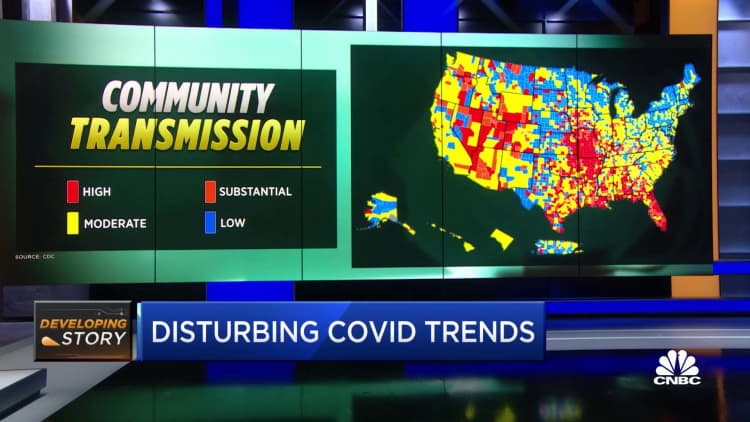
Top infectious disease specialists say the spread of the delta variant across unvaccinated pockets of the country is causing flare-ups and leading to an increase in hospitalizations as cases climb.
Nationwide, cases are once again on the rise as the highly transmissible variant takes hold as the dominant strain in the U.S. The seven-day average of newly confirmed Covid cases has climbed to about 23,300 a day, almost double the average from a week ago, according to data compiled by Johns Hopkins University.
Health officials and physicians have been hoping that high vaccination rates among the most vulnerable and oldest Americans would keep hospitalizations, which generally lag new cases by a few weeks, from also rising. But that hasn't materialized so far, doctors said on a call hosted Tuesday by the Infectious Diseases Society of America.
"Hospitalizations ICU admissions and deaths all lag behind (new cases), so we expect those to continue to get worse, substantially worse over the next two to three weeks" Dr. Andrew T. Pavia, chief of pediatric infectious diseases at the University of Utah School of Medicine, said on the call.
After several weeks of declining infections, cases are again climbing in many parts of the country, Dr. Jay Butler, deputy director for infectious diseases at the Centers for Disease Control and Prevention, said on the call. "Unfortunately that's also been accompanied by some increases in the number hospitalized, as well as emergency department evaluations, for people who are ultimately confirmed to have Covid-19," he said.
As the delta variant spreads across the U.S. it's hitting states with low vaccination rates particularly hard. First detected in India in October, the variant is quickly spreading to more than 100 countries across the world and established itself as the dominant strain in America in a few weeks.
"When the Delta strain appeared, it rapidly became the dominant strain. ... In the last full week of data, more than 80% of the sequenced viruses were delta, and so far this week it's 92% of all variants" (in Utah), Pavia said. "If you think about what it means to have a virus take over that rapidly, it means that it is the most fit virus, that is spreading more efficiently, that it is spreading in pockets that are unvaccinated and it's causing a lot of disease and a lot of stress."
Cases are rising in Missouri, Arkansas, Nevada, Utah and Florida at higher rates than in other states over the past couple of weeks. New infections and hospitalizations are highest in rural areas, where vaccination rates are low, Pavia said. "That's what drives the susceptibility to having an outbreak."
In Utah, the infection rates are highest among young people ages 15 to 45 and hospitalizations are similarly higher in those younger age groups than they were earlier in the pandemic, he said.
Roughly 80% of Americans over the age of 65, the most at-risk population, are fully vaccinated, helping to drive down hospital rates. Scientists haven't yet figured out whether the delta variant makes people sicker or not than the original ancestral strain.
U.S. health officials and physicians are still split on whether or not there will be a need for booster shots in the fall or winter.
"We're not seeing evidence at this point in time that waning immunity is occurring among people who were vaccinated back last December or January and that they are at higher risk of breakthrough infections," the CDC's Butler said.
Echoing statements made by World Health Organization officials Monday, Butler also said that breakthrough cases are often milder and that the vaccines are extremely effective in reducing hospitalization and death.
"There's even evidence that people who have breakthrough infections, who are fully immunized, are shedding less virus ... it can reduce the risk of spread to others," Butler said.
The WHO also recently recommended both vaccinated and unvaccinated people continue wearing masks and practice social distancing, citing reduced vaccine efficacy against the delta variant and increased social mixing in countries with varying rates of immunization.
"Everyone wants this to be over, and a lot of the behavior that I think is driving the spread of infections is people wanting it to be over, and acting as if it's over and really abandoning even the more modest precautions like mask-wearing," Pavia said.



